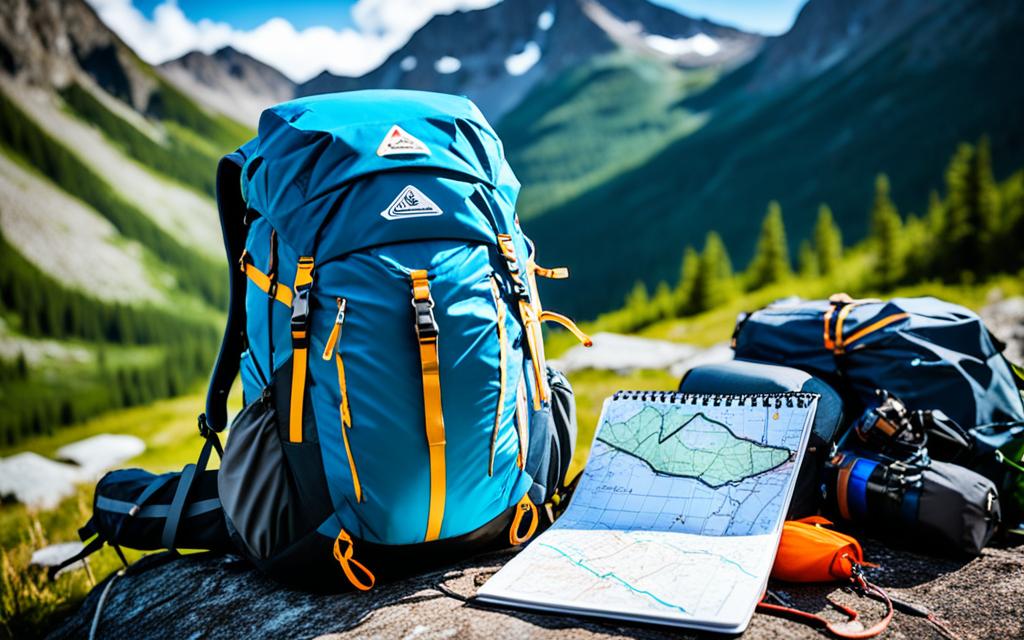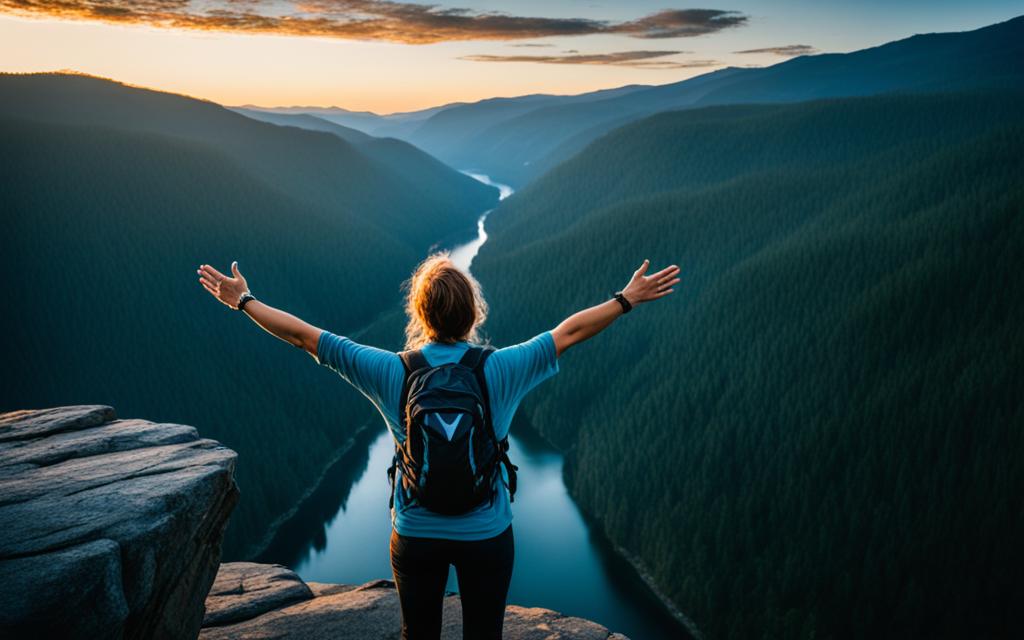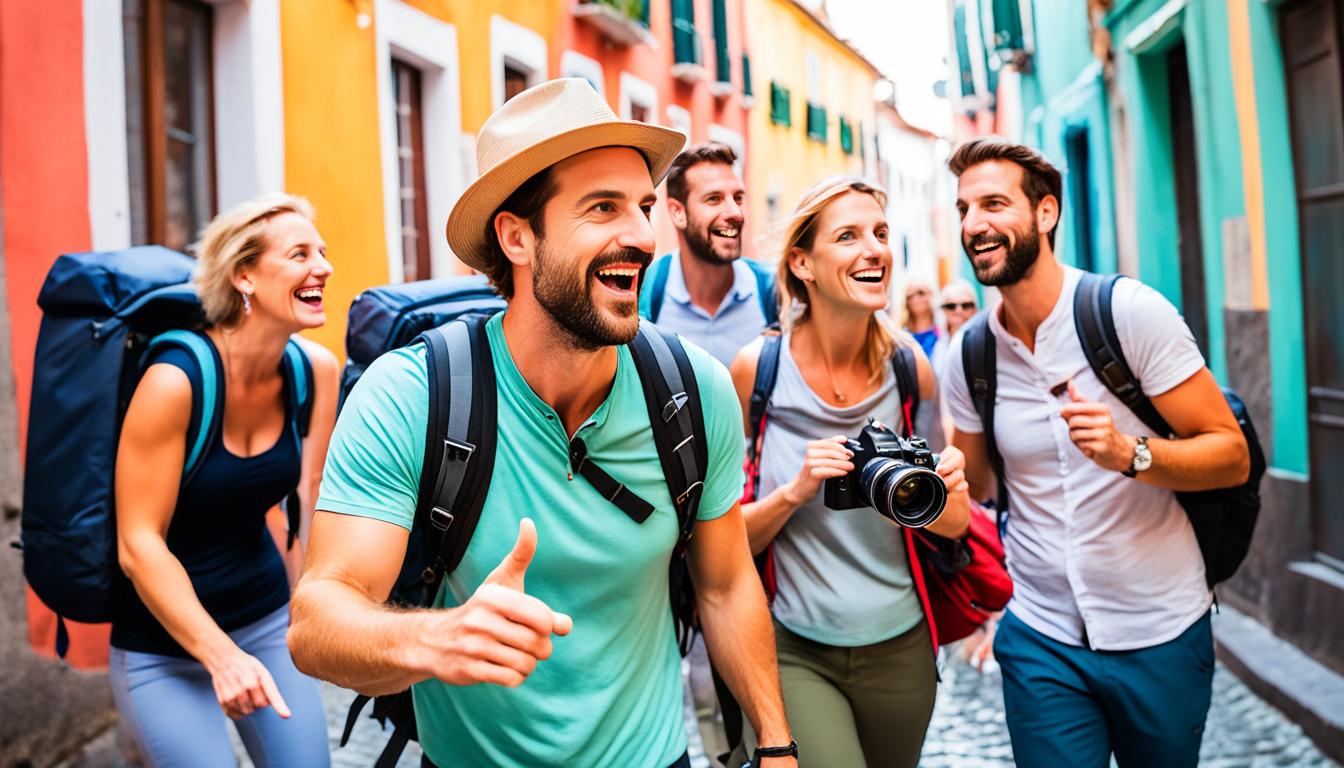Starting a solo journey is a personal and transformative experience. It brings deep psychological benefits and unique challenges. The thrill of exploring alone can unlock a new level of self-awareness. For example, the author went on their first solo backpacking trip at 16, covering 30 miles in Washington’s wilderness. They suggest starting small with day hikes in familiar places to gain confidence.
Planning is key for a successful solo trip. You need to know the terrain, weather, and map out your route. It’s also important to prepare for unexpected challenges. Choosing the right gear, like navigation tools and communication devices, is crucial.
Sharing your trip details with a trusted person is also essential. This includes your itinerary, where you’re going, and when you plan to return.
Getting mentally prepared is important when facing solitude. Learning to manage feelings like anxiety and fear can make solo backpacking better. Start with shorter, easier hikes to build confidence and skills. Always put safety first by making careful decisions.
Over the last 15 years, the author has taken many solo trips in the US and abroad. They’ve even done WWOOFing in England. Despite not facing danger, they’ve found kindness from others everywhere. The author encourages others not to let fear stop them from exploring solo. Their book, “Guide for Worldly Women: Confidently Plan the Perfect Trip & Travel Independently,” shares stories from over 16 years of solo travel.
The Freedom and Empowerment of Independent Travel
Starting an independent travel journey gives you a unique feeling of freedom and empowerment. It’s a chance for the lone traveler to grow and discover themselves. Imagine exploring the world on your own, making your own choices, and facing new challenges alone. This experience changes you, pushing you to grow and develop in ways you never thought possible.

The Psychological Benefits of Traveling Alone
One of the biggest perks of traveling alone is the boost to your confidence and self-understanding. It encourages you to think deeply about what you want and need. Many solo travelers, 67%, say they feel more confident and independent after their trip. They also feel more connected to different cultures and people, showing how travel can bring you closer to the world and its inhabitants.
Building Confidence and Self-Reliance
Traveling alone is a great way to build confidence and learn to rely on yourself. You learn to be resilient, solve problems, and adapt to new situations. Most solo travelers, 72%, say their trips helped them make better decisions and handle surprises well. By taking care of your travel plans by yourself, you pick up important life skills. This confidence you gain can help you in all areas of life, making you more self-assured and capable.
Personal Growth through Self-Discovery
Traveling alone is also a journey of self-discovery. Without others’ opinions, you can follow your own interests and passions. This journey is a chance for personal growth, as 91% of solo travelers see it as a time of self-discovery. It helps you face and beat your fears, building inner strength and a fearless attitude towards life. Independent travel leads to holistic growth, giving you a clearer sense of purpose and direction.
Planning Your Solo Exploration: Essential Tips
Planning is key to a great solo trip. Pick the right places, make a safety plan, and stick to your travel budget. This way, solo backpackers can have a smooth and fun trip.

Choosing the Right Destination
Choosing the best place for your solo trip is very important. Make sure it fits your interests and your skills. For example, Spain and Singapore are great for safety and easy access.
Tokyo, Japan, is perfect for solo travelers because of its good public transport. But, places like South Africa, Brazil, and Mexico can be risky for solo women. Knowing about the local plants, animals, land, and weather helps a lot with planning.
Creating a Safety Plan and Informing Loved Ones
Having a safety plan is crucial for solo travelers. Tell your loved ones where you’re going and check in often. Keep important phone numbers handy.
- Look up local emergency numbers.
- Tell your travel plans to friends or family.
- Stay in touch with people you trust.
Budgeting for Your Journey
Planning your money is important for a smooth trip. Think about where you’ll stay, what you’ll eat, and how to handle unexpected costs. Places like Thailand and Lisbon, Portugal, are great for saving money but still offer lots to see and do.
Remember, budgeting doesn’t mean you have to give up safety or comfort. It’s about finding a good balance.
| Destination | Safety Rating | Cost Efficiency |
|---|---|---|
| Spain | High | Moderate |
| Singapore | High | High |
| Thailand | Moderate | High |
| Lisbon, Portugal | Moderate | High |
Follow these tips to plan and start your solo backpacking trip with confidence.
Gear Up: Packing Essentials for Solo Backpacking
Starting a solo backpacking trip means paying close attention to what you pack. It’s important to choose gear that is both light and useful. This helps you carry less weight and avoid the mistake of overpacking.
Choosing Lightweight and Multi-Purpose Gear
For solo backpacking, it’s smart to pick gear that is both light and versatile. Look for a compact tent, a sleeping pad, a camp pillow, and a sleeping bag that are useful yet light. Even though high-quality, lightweight gear might cost more, it makes trips easier and longer.
- Backpack
- Lightweight tent with footprint
- Sleeping pad
- Camp pillow
- Sleeping bag
- Cooking system
- Appropriate clothing
- Food for an extra day
- Bear can or food storage
- Water supply and filter
- Toiletries
- Microfiber towel
- Personal items
Navigation Tools: Maps, GPS, and Compasses
Having the right tools for navigation is key for solo backpacking. Maps, GPS devices, and compasses help you stay on track, even in new places. It’s smart to check the trail conditions before you go, looking for hazards, fire rules, and where to find water.
| Tool | Primary Use |
|---|---|
| Map | Mental visualization and backup |
| GPS | Accurate positioning |
| Compass | Directional guidance |
Emergency Supplies: First Aid Kits, Communication Devices
Being ready for emergencies is crucial when you’re backpacking alone. A good first aid kit and devices like a satellite messenger or personal locator beacon are essential. Taking classes in wilderness survival and first aid prepares you for the unexpected.
- First aid kit
- Satellite messenger
- Personal locator beacon
- Weather-watch device
By carefully planning and packing the right gear, you can make your solo backpacking trips better. This ensures you’re ready for whatever the wilderness throws your way.
Embracing Solo Adventures: Tips for First-Timers
Starting your first solo trip can feel exciting and a bit scary. For those new to solo travel, getting ready and keeping an open mind is key. Here are some tips to make your journey better.
Safety should be your main concern when traveling alone. Do your homework on your destination to know the culture, safety tips, and what to do in emergencies. Carry a whistle, a portable charger, and keep important papers safe.
Solo travel for women has become more popular, showing how empowering and rewarding it can be. By respecting local customs and fitting in, you show respect and get a better experience. Learn a few local phrases and stay alert to avoid trouble.
Don’t forget to pack the essentials. Bring things like water, a way to communicate without internet, and clothes that can be worn many ways. A portable charger, a first aid kit, and clothes that can be mixed and matched are must-haves. It’s better to pack light but smart.
Feeling lonely or homesick is normal on your first solo trip. Keep in touch with family through video calls and don’t be afraid to make new friends. Joining groups in hostels or finding travel buddies can help you feel less alone. Enjoy being alone but be open to making new friends.
Dealing with the mental side of solo travel is important. Facing your fears and worries is part of the adventure. Remember, people usually don’t bother solo travelers much, which will make you feel more confident. Focus on enjoying the moment and taking in the beauty around you. This way, you’ll truly experience the wonder of your trip.
Navigating Solo: Cultural Immersion and Interaction
Going solo on an adventure lets you dive deep into new cultures. You can explore freely, making spontaneous discoveries and meeting new people. This way, you get to truly understand and value different cultures. By connecting with locals and other travelers, you make your trip unforgettable.
Practicing Cultural Sensitivity
Being mindful of local customs makes your cultural immersion better. Solo travelers should respect the norms they find, like learning about local ways and dressing right. Joining in local activities shows respect and gives you a real look at their life. It helps you see things from another perspective, making your trip more enriching.
Connecting with Locals and Fellow Travelers
Connecting with people while traveling solo is very rewarding. Talking to locals gives you tips on the best food and secret spots. You also meet other travelers who become friends. Whether it’s through group tours or staying in hostels, these connections make your trip better and give you a sense of belonging.
Overcoming Language Barriers
Language can be a challenge for solo travelers, but it’s not insurmountable. Learning a few local phrases helps a lot. Technology like translation apps can also help. And don’t forget, gestures and facial expressions are key in talking to locals. Using these methods makes your trip smoother and more meaningful.
Source Links
- https://www.sixmoondesigns.com/blogs/newsletter/embracing-the-solitude-the-ultimate-guide-to-solo-backpacking-by-brandon-armstrong
- https://org.wwoof.uk/blog/2023/12/21/embracing-solo-adventures/
- https://ericnwankwo.medium.com/embrace-your-independence-solo-travel-tips-and-inspiring-stories-3fdbd62dbfa5
- https://www.suetanyamchorgh.com/blog-podcast/traveling-solo-embracing-the-freedom-and-adventure
- https://www.seeingsam.com/planning-first-solo-travel-trip/
- https://pullman-ciawi-vimalahills.com/news/the-lone-explorers-guide-top-10-tips-for-solo-traveling-adventures/
- https://www.treelinereview.com/learn-skills/guide-to-solo-backpacking
- https://www.the-hungry-hiker.com/2022/11/12/how-to-prepare-for-your-first-solo-backpacking-trip/
- https://medium.com/@kelley.jorgensen1/embracing-the-adventure-a-guide-for-solo-female-travelers-2741644160ae
- https://www.shiftcollab.com/blog/embracing-the-journey-of-solo-travel
- https://www.linkedin.com/pulse/embracing-solitude-joys-challenges-solo-travel-rasika-p-jmfgc
- https://medium.com/@travelunravel.co/solo-travel-take-a-trip-with-yourself-aaf13db8fcf2
- https://www.blackandabroad.com/travel/reasons-why-a-solo-trip-should-be-your-next-trip

